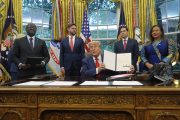
True the Vote, a group dedicated to restoring trust in America’s elections, presented research that they claim shows that more than 137,000 votes were illegally cast in the 2020 general election in Wisconsin. The hearing took place at the state Capitol in Madison on March 24. That hearing can be heard in full here.
True the Vote has alleged widespread instances of ballot trafficking, mainly in the Milwaukee area but also in other large Wisconsin cities. Ballot trafficking is a practice in which votes are solicited — oftentimes in exchange for money or other goods. Those trafficked ballots are then “harvested” by third-party actors and delivered to absentee boxes illegally.
These ballot harvesters are often partisans, or are paid by partisan groups. A high profile case in Texas was highlighted by James O’Keefe and Project Veritas when an undercover journalist caught Rachel (also known as Raquel) Rodriquez admitting to the practice.
“For the past sixteen months we have heard the repeated refrain from those responsible for overseeing elections, that this was the most secure election ever, and to think otherwise is a lie,” said True the Vote founder Catherine Engelbrecht. “But America knew differently. And they were right.” She continued:
It was not the most secure election ever; it was quite possibly one of the least. We watched the mass mail-out of paper ballots to highly inaccurate voter records, the harried installation of by mail absentee drop boxes privately funded by billionaire tech magnates, and the hundreds of legislative changes, lawsuits, consent decrees — all that fundamentally altered election processes, and all of this came together in 2020 under the fog of COVID.
True the Vote used cellphone “pings” to reconstruct the movements of suspected ballot harvesters, tracking their movements to various drop boxes, and researchers used a technique known as geospatial mobile device signal analysis — a manner of reconstructing a “pattern of life” for cellphone holders. “From these pings, it can be determined where you work, where you sleep, and even what floor you are on within inches,” said Gregg Phillips, a cyber expert employed by True the Vote to research the issue.
Phillips called the suspected ballot trafficking “An organized crime against Americans.”
In the Wisconsin areas examined by True the Vote from October 20 through November 3 of 2020, Phillips noted that some 138 individuals visited the location of a nongovernmental organization at least five times and made a combined total of 3,588 trips to absentee ballot drop boxes.
“That’s an average of 26 trips per person to drop boxes in the Milwaukee area,” Phillips noted.
When asked by Democratic state Representative Lisa Subeck if this was evidence of actual fraud, Engelbrecht said: “Vote trafficking is being done through the process. It is illegal.”
And this type of activity wasn’t unique to Wisconsin, either. Phillips conducted a 15-month investigation of similar practices in Georgia, Arizona, Pennsylvania, Texas, and Michigan. Along with Wisconsin, Joe Biden would end up taking each of those battleground states (with the exception of Texas) in 2020. Biden won Wisconsin by less than 21,000 votes, and the vote was similarly close in Arizona, Michigan, Pennsylvania, and Georgia. Those electoral votes were more than enough to have swung the general election in favor of Donald Trump.
Part of the problem, according to True the Vote, is that many doing the ballot harvesting don’t even know they’re committing a crime.
“Many of the traffickers we spoke with do not recognize what they are doing as being a problem,” Engelbrecht said.
The supposedly bipartisan Wisconsin Elections Commissions (WEC), whose own audit showed no malfeasance that could have swayed the outcome of the 2020 election, was noncommittal in a statement regarding True the Vote’s testimony:
“Data allegedly showing cell phones that were tracked multiple times near absentee ballot drop boxes is, alone, not evidence of a crime.”
It may not be proof of a crime, but it is evidence that one may have been committed. And it is a reason for former Wisconsin Supreme Court Justice Michael Gableman’s investigation into possible fraud in the 2020 general election in the Badger State to continue.





